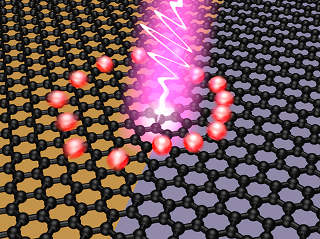Researchers at the Institute of Photonic Sciences (ICFO) have shown that a graphene-based photodetector can convert light into electrical signals within 50 femtoseconds.
 Ultrafast photovoltage creation after light absorption at the interface of two graphene areas with different Fermi energy.
Ultrafast photovoltage creation after light absorption at the interface of two graphene areas with different Fermi energy.
The study was a joint effort of ICFO researchers Lukasz Piatkowski, Klaas-Jan Tielrooij, Achim Woessner, and Mathieu Massicotte, headed by ICREA Professor Niek van Hulst and ICFO Professor Frank Koppens; the research team headed by Jeanie Lau at UC Riverside; and the research team headed by Pablo Jarillo-Herrero at MIT.
In many technologies, spanning from solar cells to cameras, the fast conversion of light into electricity plays an important role.
In data communication applications, this conversion process also plays a major role by enabling the conversion of data carried by light into electrical signals which can be processed by electronic circuits.
Graphene is known to be a fast and highly efficient converter of absorbed light into electrical voltage. However, until now it was not possible to gauge the rapid reaction of graphene to extremely short pulses of light.
Graphene contains conduction band carriers. Quick and efficient interaction between these carriers leads to a rapid generation of a photovoltage in the graphene material.
This kind of interaction results in an electron distribution with a high electron temperature - essentially this means that the energy absorbed from light is quickly and efficiently converted into electron heat.
This electron heat can then be converted into electrical voltage by an interface between two regions of graphene doped with different chemicals.
This phenomenon, called the photo-thermoelectric effect, takes place almost instantly.
In this study, the researchers were able to time the process, using highly sensitive electrical readouts and an ultrafast pulsed laser.
They clocked the conversion time at just 50 femtoseconds (5 x 10-14 seconds), which will interest a variety of scientists an engineers who may be able to make use of graphene in photonic and optoelectronic devices.
The results of this research have been published in Nature Nanotechnology.